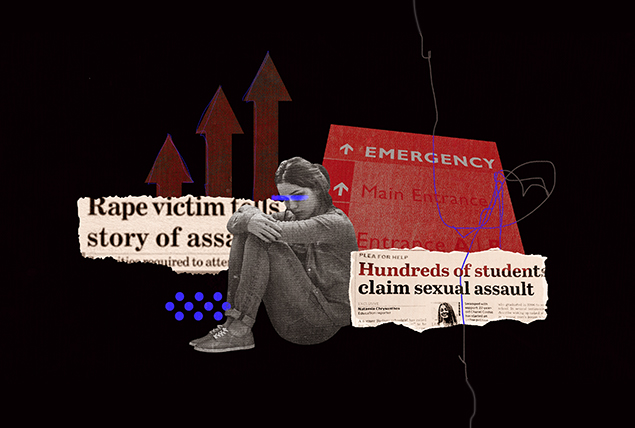Sexual Assault of Girls Increased During Pandemic, CDC Says

Recently released federal data shows that American girls have been raped at higher rates during the pandemic.
In 2021, nearly 1 in 5 American high school girls, 18 percent, reported being survivors of sexual violence and more than 1 in 10 reported being raped, according to new data from the Centers for Disease Control and Prevention (CDC).
Every other year, the CDC collects responses to its Youth Risk Behavior Survey to gauge American teens' mental and sexual health.
The latest data set, released in 2023, includes responses from approximately 17,000 teenagers collected in the fall of 2021 during the height of the COVID-19 pandemic. The survey's results highlight worsening crises of mental health and sexual violence, particularly among America's teenage girls.
"Across almost all measures of substance use, experiences of violence, mental health and suicidal thoughts and behaviors, female students are faring more poorly than male students," the CDC's 2021 Youth Risk Behavior Survey report states.
The number of girls reportedly raped in 2021 increased by almost 200,000 in two years, to approximately 1 million, according to the 2021 data.
Overall, reported sexual violence of girls increased by 20 percent compared with 2017 CDC survey responses.
About 30 percent of teenage girls considered attempting suicide in 2021, the highest number in a decade—a 60 percent increase compared to 2011 survey responses.
"These data are hard to hear and should result in action," said Debra Houry, M.D., M.P.H., the CDC's chief medical officer, during a news conference. "As a parent to a teenage girl, I am heartbroken."
Houry said the 2021 survey findings should be seen as a call for Congress to invest in school mental health programs.
"These data show a distressing picture," Houry said. "America's teen girls are engulfed in a growing wave of sadness, violence and trauma. Over the past decade, teens, especially girls, have experienced dramatic increases in experiences of violence and poor mental health and suicide risk. Findings also confirm ongoing trauma among lesbian, gay, bisexual and questioning youth."
Survivors of sexual violence are often at an increased risk for suicidal ideation, studies have shown.
"For every 10 teenage girls you know, at least one of them, and probably more, has been raped," said Kathleen Ethier, Ph.D., the CDC's director of adolescent and school health. "This tragedy cannot continue."
National Parent Teacher Association President Anna King described the survey data as "extremely heartbreaking," during the CDC's media conference about the report.
King recounted her family's painful experience of losing their 15-year-old niece to suicide during the pandemic, and called on parents and guardians to talk to their children about their mental health.
"Regardless of where our children come from or who they are, they need us to band together," King said. "Every adult should have a vested interest in ensuring our children are whole physically and mentally. We cannot afford to leave any child or young person behind."
Parents, teachers and schools need to work together to support teenage youth, she said.
The CDC report's findings weren't all bad. The survey data showed American teens reportedly engaged in risky sexual behaviors less often in 2021. But safe sexual practices such as condom use and testing for HIV and sexually transmitted infections (STIs) also declined compared with 2019 data.
Poor mental health and suicidal thoughts and behaviors increased for nearly all youth groups, according to the report.
As America experiences an ongoing teacher and counselor shortage in public schools, Ethier called schools the "front line" in the teenage mental health crisis, and said teachers need to be trained to manage and spot the signs of mental health problems in their classrooms.
"Parents have such an important role," Houry added. "If you notice any changes in your child's behavior around eating or sleep, certainly ask them about it. And, more importantly, be as involved as you can be."
The CDC news conference did not touch on the health insurance sector's role in America's teenage mental health crisis.
In 2021, approximately 3.9 million children younger than age 19 lacked health insurance needed to access basic mental healthcare, according to the U.S. Census Bureau's 2022 report on health insurance coverage.
The National Suicide Prevention Lifeline, 988, is available 24 hours a day, seven days a week, in English and Spanish, by phone or text for sexual violence survivors or anyone experiencing a mental health crisis.


















